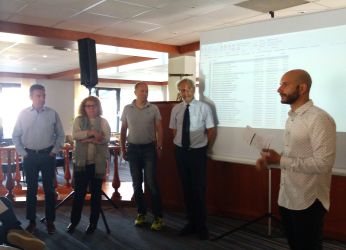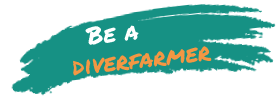The advisory board includes personnel from the Junta de Andalucía, the Ministry for Agriculture of Finland and representatives from European agrarian trade unions
The change in paradigm in European agriculture will suppose focusing on a model based on crop diversification, the conscious use of natural resources through management techniques appropriate for this end and the participation of farmers and final users. Building said model also counts on a staff of experts in the agriculture sector who will guide the project’s objectives in order to ensure they crystallise into measures within European agrarian policies.
The main function of this external advisory board is to evaluate the progress of the project and orientation regarding future work; they therefore attend annual meetings and monitor the drift of the Diverfarming project, which is financed by the H2020 project of the European Commission.
 In order to ensure that this objective has a set focus a multidisciplinary team has been selected, consisting of five representatives who pool the interests and concerns of the scientific community, the agriculture sector and the agri-food industry, without forgetting political representatives in agricultural matters.
In order to ensure that this objective has a set focus a multidisciplinary team has been selected, consisting of five representatives who pool the interests and concerns of the scientific community, the agriculture sector and the agri-food industry, without forgetting political representatives in agricultural matters.
Thus, Doctor Berta de los Santos García de Paredes is a member of this board as well as coordinator of the “Área de Producción Vegetal Sostenible” of the IFAPA – CAPDER (Junta de Andalucía). As a representative of the governmental authority responsible for the agricultural value chain in contact with those who govern, this researcher works on the analysis of alternatives to the use of chemical products in agriculture, as well as in their rational and integrated use. This research path and her close connection with the institution are what will enable her to serve as a guide for the action in work package 3 of the project, which is responsible for confirming how crop diversification and the efficient use of resources have positive effects on production.
Alessandro Banterle heads the Department of Political and Environmental Science at the University of Milan and provides a scientific profile relating to the value chain and the socioeconomic impact, so his contributions will be focused on the assessment of consumer behaviour, food policies and the environmental sustainability that the project can generate.
Doctor Michael Schloter is the Director of the Institute for Comparative Microbiome Analysis at the Helmholtz Centre in Munich and an expert in studying the behaviour of microbiome in different surroundings and their interaction with the environment. He will therefore work together with the project team dedicated to assessing how the diversification increases biodiversity above and below ground.
The person in charge of representing the agricultural community and the agri-food industry is Nicolas Ferenczi, who belongs to the European trade union COPA – COCEGA and who is currently in charge of economic and international issues at AGPB (the generally society of wheat producers) which represents more than 100,000 French cereal growers. Ferenczi’s career serves as a reference to know the situation and needs of interested parties and final users of Diverfarming.
Lastly, the ministerial adviser at the Ministry for Agriculture and Silviculture in Finland, Birgitta Vainio – Mattila will provide the knowledge on the sustainable food system in different dimensions, ranging from its mitigation and adaptation in the face of climate change, to striving for the circular economy.
In addition to guiding and facilitating the fora where the project will come into contact with the community at large, the assessment work of this panel of experts will provide guarantees and reliability to the change in paradigm proposed by Diverfarming.
Diverfarming is a project financed by the Horizon 2020 Programme of the European Commission, within the challenge of “Food Security, Sustainable Agriculture and Forestry, Marine, Maritime and Inland Water Research and the Bioeconomy”, which counts on the participation of the Universities of Cartagena and Córdoba (Spain), Tuscia (Italy), Exeter and Portsmouth (United Kingdom), Wageningen (Netherlands), Trier (Germany), Pecs (Hungary) and ETH Zurich (Switzerland), the research centres Consiglio per la ricerca in agricoltura e l'analisi dell'economia agraria (Italy), the Consejo Superior de Investigaciones Científicas (Spain) and the Natural Resources Institute LUKE (Finland), the agrarian organisation ASAJA, and the companies Casalasco and Barilla (Italy), Arento, Disfrimur Logística and Industrias David (Spain), Nieuw Bromo Van Tilburg and Ekoboerdeij de Lingehof (Netherlands), Weingut Dr. Frey (Germany), Nedel-Market KFT and Gere (Hungary) and Paavolan Kotijuustola and Polven Juustola (Finland)).










